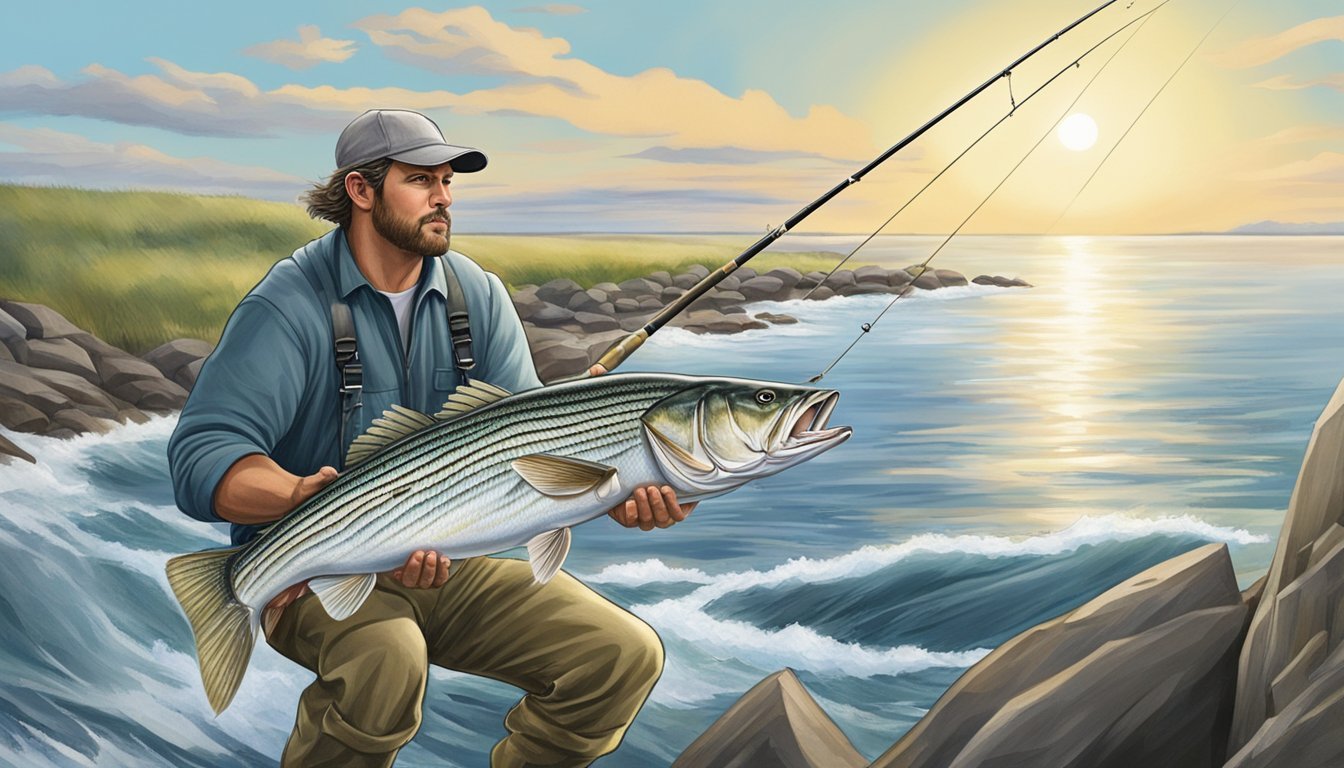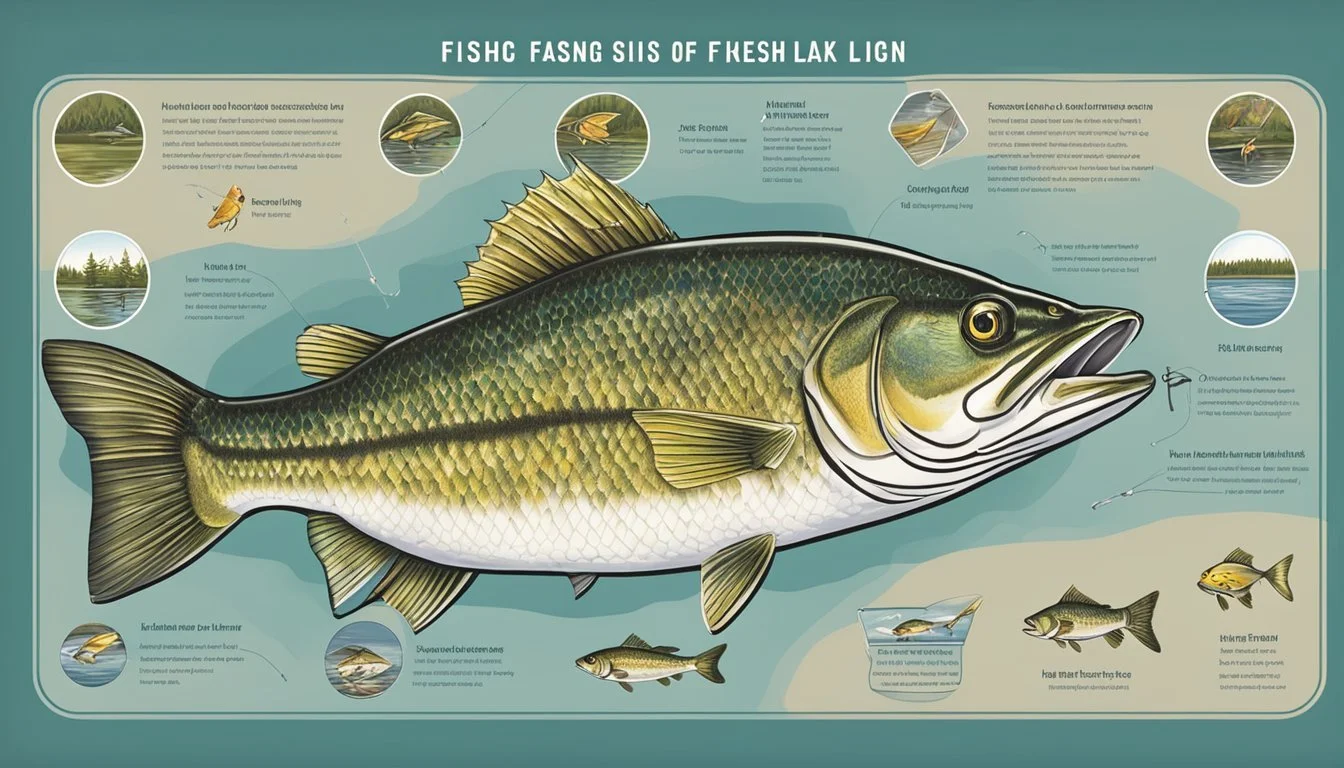Best Fish to Catch and Eat in New Jersey
Your Ultimate Guide
New Jersey's diverse waterways offer a wealth of fishing opportunities for both locals and visitors. The state's rivers, lakes, and coastal regions are teeming with various species of fish (What wine goes well with fish?) that are not only a joy to catch but also provide delicious and healthy dining options. Anglers in the Garden State can expect to encounter a selection of freshwater and saltwater fish, each with unique characteristics and flavors that make them ideal for different culinary preparations.
Among the finest fish to catch and eat in New Jersey are the succulent scallops (What wine goes well with scallops?) found along the coast, renowned for their sweetness and meaty texture. Further inland, freshwater fishing enthusiasts can look forward to reeling in species like the light-sensitive walleye, which thrives in the low light conditions of dawn and dusk. Other local favorites include a variety of panfish such as bluegills, pumpkinseeds, and redbreast sunfish, which offer not only an active fishing experience but also a tasty meal.
In addition to these species, New Jersey waters also produce lake trout, bass, and rainbow trout, especially in locations like the Round Valley Reservoir, a hotspot known for its pristine waters and scenic beauty. These fish provide a rich source of protein, minerals, and vitamins, and are considered by many health experts, including the American Heart Association, to be a beneficial part of a balanced diet. With an abundance of fishing locales and a plethora of fish species to choose from, fishing in New Jersey is as rewarding on the line as it is on the plate.
Popular Fishing Species in New Jersey
New Jersey waters offer a diverse range of fish species for anglers to target, each providing a unique angling experience and culinary opportunity.
Saltwater Fish
Striped Bass: Frequently targeted for their fighting prowess and flavorful meat, striped bass are found in coastal waters.
Flounder: Includes species like fluke; treasured for delicate white fillets.
Bluefish: Known for aggressive strikes and strong flavor; best when fresh.
Tautog: Also known as blackfish; sought after for its firm, white flesh.
Other noteworthy saltwater catches include the mighty tuna (What wine goes well with tuna?) and swordfish, which offer a thrilling offshore fishing challenge and yield meat suitable for various culinary preparations. Mackerel and tilefish are also common and prized for their taste.
Freshwater Fish
Trout: The most popular among New Jersey anglers; brook trout is the official state fish and is celebrated for its taste.
Walleye: Recognized for their white, flaky meat; found in several lakes.
Largemouth Bass & Smallmouth Bass: Both are popular for sport and have a dedicated angler following.
Sunfish: Families of fish like bluegill and pumpkinseed provide fun, light tackle fishing and are good panfish.
Freshwater bodies in New Jersey are also home to species such as carp, pike, and several types of crappie. These species contribute to the rich tapestry of fishing experiences available in the state. Native species like the chain pickerel and white crappie round out the diverse freshwater fishing scene.
Best Time of Year for Fishing
In New Jersey, the fishing experience varies greatly with the changing seasons. Each quarter brings its own prime catches and conditions for anglers.
Spring Fishing
Spring starts in April and is a season of revival for fishing in New Jersey. Anglers eagerly anticipate the start of striped bass runs and the beginning of trout season. They make for excellent catches that are both challenging and rewarding, offering fresh and flavorful seafood for the table.
Summer Fishing
Throughout the summer months, the waters are abundant with a variety of species. From May through September, fishermen can hook bluefish, tuna, mahi-mahi, flounder, and even sharks. The warm weather opens up a greater variety of fishing spots, and the long days provide ample time for both early and late expeditions.
Fall Fishing
Fall fishing, particularly in September, can be productive as many species are still available and the cooling waters can result in increased fish activity. Striped bass and bluefish continue to be among the top targets for anglers looking to fill their coolers with succulent seafood.
Winter Fishing
Though winter slows down, New Jersey's northern lakes offer reliable ice fishing opportunities, especially in January. Fish such as pickerel and perch are often sought after during this time. Despite the season's challenges, the persistent angler can still find success.
New Jersey's Prime Fishing Locations
New Jersey boasts a diverse array of fishing locations, from the vast Atlantic Ocean and its bays to the scenic lakes, reservoirs, rivers, and streams inland. Anglers can expect a range of species suitable for both sport and table fare.
Ocean and Bay Fishing
New Jersey's saltwater fishing is prominent along its 130 miles of Atlantic coastline and in the various bays. Cape May and Ocean City provide access to the Atlantic Ocean, where enthusiasts often seek out game fish like striped bass. Delaware Bay offers unique opportunities for catching fish such as weakfish and bluefish. Raritan Bay, bridging Staten Island and the mainland, is especially noted for its spring and fall striped bass runs.
Lake and Reservoir Fishing
Freshwater fishermen in New Jersey can explore numerous lakes and reservoirs teeming with a variety of fish. Lake Hopatcong and Manasquan Reservoir are top choices for those targeting species like largemouth bass. Additionally, Round Valley Reservoir is renowned for its trout fishing, maintaining a stock of rainbow and brown trout that appeal to anglers looking for a freshwater challenge.
River and Stream Fishing
The state's freshwater fishing also extends to over 240 rivers, streams, and creeks. The Delaware River marks the state's border with Pennsylvania and offers fertile grounds for shad during their spring migration. Smaller rivers and streams throughout New Jersey, some meandering through the Great Bay area, are accessible to anglers targeting species such as the American eel and various panfish.
Fishing Techniques and Tackle
This section focuses on the specific techniques and tackle necessary for successful angling in New Jersey's diverse aquatic environments.
Saltwater Techniques
When targeting saltwater species along the Jersey Shore, anglers should have a versatile selection of tackle. It's essential to use heavy-duty rods and reels capable of handling large fish. For shore fishing, a long surf rod paired with a sturdy reel spooled with 20-30-pound test line is standard. Successful shore fishing techniques often include casting lures like spoons or plugs into the surf. For deep sea fishing, anglers equip their rods with stronger line, up to 100-150-pound test, to withstand the fight from species like bluefin tuna. The addition of chum and live bait like herring or mackerel can entice these predatory fish.
Baits:
Surfcasting: spoons, plugs, bunker chunks.
Deep Sea: live herring, mackerel, squid.
Freshwater Techniques
Freshwater fishing in New Jersey offers opportunities to catch and eat species such as trout and bass. For trout fishing, lightweight spinning tackle is preferred, with 4-8-pound test line offering a good balance of sensitivity and strength. Anglers often use natural baits like worms or artificial lures such as spinners to attract trout. For bass, slightly heavier tackle and a variety of lures, including jigs and plastic worms, prove effective. Fishing spots around structures or drop-offs in lakes and rivers can yield productive results for bass anglers.
Lures:
Trout: spinners, small spoons, flies.
Bass: plastic worms, jigs, crankbaits.
Ice Fishing Insider Tips
Ice fishing in New Jersey requires specialized tackle due to the cold and ice-covered waterways. A short, robust rod with a sensitive tip helps detect light bites from fish like perch or pickerel beneath the ice. Anglers should use line in the 2-6-pound test range for subtlety and ensure it's suitable for low temperatures to prevent breakage. Baits such as minnows or wax worms often tempt fish during the winter months. Portable shelters and heaters can also enhance the ice fishing experience, allowing anglers to remain on the ice longer and in comfort.
Ice Fishing Essentials:
Tackle: robust, short rods; light lines; jigs; ice augers.
Baits: minnows, wax worms, maggots.
Regulations and Conservation
In New Jersey, anglers play a critical role in the conservation of marine life and the enhancement of the fishing experience. Adhering to regulations is necessary to ensure sustainable fishing opportunities for future generations in the Garden State.
Fishing License Requirements:
Residents: All New Jersey residents between the ages of 16 and 70 must possess a valid fishing license to fish the fresh waters of New Jersey.
Non-Residents: All non-residents 16 years and older are also required to have a valid fishing license.
Game Fish Protection:
Size and Bag Limits: These are established to prevent overharvesting and to protect game fish populations.
Seasons: Certain times of the year are designated for fishing specific species to allow for spawning and population recovery.
Conservation Methods:
Catch and Release: Encouraged among fishermen to conserve fish stocks.
Use of Barbless Hooks: Facilitates the release of fish with minimal harm.
Purchasing Equipment:
Contributions from the purchase of fishing equipment and licenses support conservation efforts through the federal Sport Fish Restoration program.
Fishing Regulations:
Regulations are updated annually, and any new regulations are highlighted to inform anglers of changes. These can include alterations in size limits, bag limits, or allowable gear.
Fishermen are urged to remain informed and compliant with all current regulations to maintain the integrity of the fishing action and the health of aquatic ecosystems. This shared responsibility ensures an enjoyable fishing experience in New Jersey's diverse waterways.
Cooking and Enjoying Your Catch
New Jersey offers a diverse array of fish for anglers, spanning from the rich saltwater coastline to the tranquil freshwater inland locales. Specific preparation techniques can enhance the natural flavors of each catch, ensuring a delightful gastronomic experience.
Preparing Saltwater Fish
Bluefin tuna is a prize among saltwater anglies in New Jersey, celebrated for its rich taste. To prepare, it's essential to bleed the tuna immediately after the catch and keep it chilled. Mahi-mahi is another delicious catch; its firm texture makes it ideal for grilling. Remove the bloodline from mahi-mahi fillets to avoid a fishy taste.
When dealing with kingfish or sailfish, one needs to ensure proper cleaning and timely refrigeration. Wahoo, a fast-swimming game fish, is known for its delicate and lean meat, which should be cooked carefully to prevent drying out.
Preparing Freshwater Fish
Freshwater species such as American eel, redbreast sunfish, and American shad offer unique flavors. American eel should be skinned and can be smoked for a traditional delicacy. Redbreast sunfish, often found in New Jersey's streams, are best when pan-fried to enhance their sweet, nutty flavor. For American shad, known for their bony structure, careful filleting is important.
Fish Cooking Methods
Grilling, broiling, and blackening are excellent methods for fish like bluefin tuna and mahi-mahi, providing a robust flavor and texture. American shad and redbreast sunfish are suitable for pan-frying, which brings out their delicate taste.
Method Fish Considered Best Notes Grilling Bluefin Tuna, Mahi-mahi High heat for a short time preserves moisture and texture. Broiling Kingfish, Sailfish Quick cooking under intense heat offers a slightly crispy exterior. Blackening Wahoo A Cajun-inspired method that gives a spicy crust without overpowering the fish. Smoking American Eel Brining and slow-cooking adds depth of flavor; perfect for evening gatherings. Pan-frying Redbreast Sunfish Best when cooked golden; serves up a light meal especially during fall.
For those targeting stripers, or striped bass, evening proves to be an opportune time to catch these predators. The cooking method for stripers depends on their size; grilling or oven roasting is recommended for larger fish.





